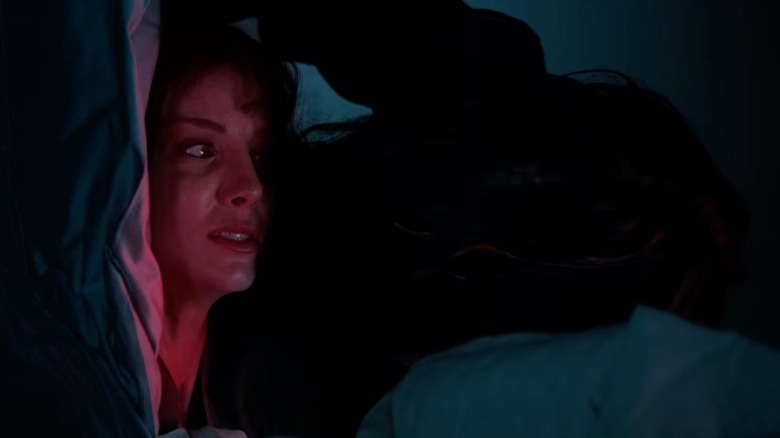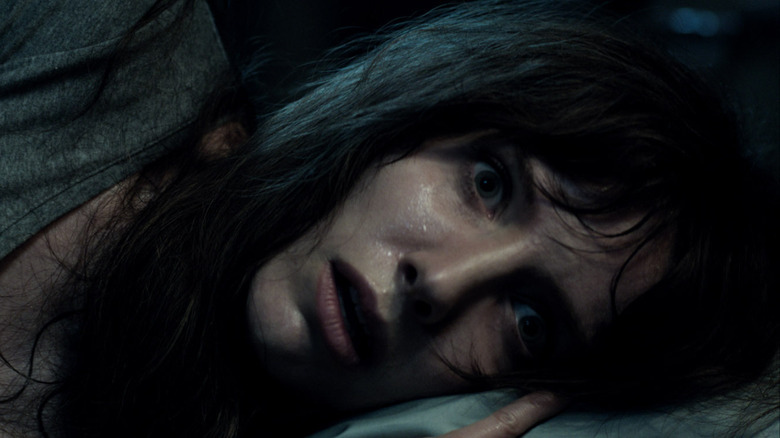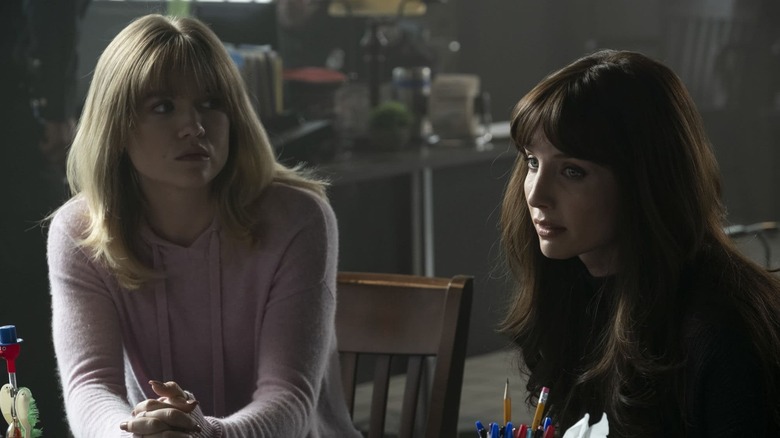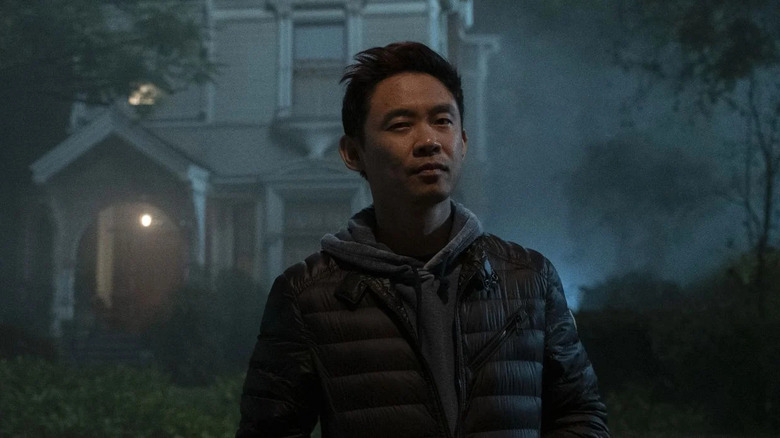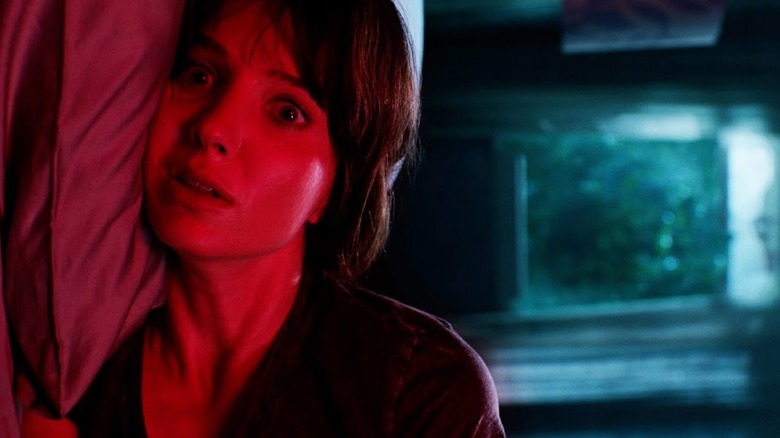Malignant Ending Explained: Let's Break Down That Bonkers Conclusion
James Wan, the mind behind "Saw," "Insidious," "The Conjuring" and, more recently, "Aquaman," made his glorious return to the world of horror over the weekend with "Malignant." The director hadn't made a horror movie since 2016's "The Conjuring 2," so this was no small thing. After all, it's pretty fair to say Wan may well be our most prominent modern master of horror. That being said, he did not make another friendly franchise play here. As those who have witnessed "Malignant" know, this thing is absolutely bananas – and the third act is one of the most memorable from a mainstream movie in recent memory. As such, there is much to discuss. So, let's dig in, shall we?
Warning: major spoilers for "Malignant" follow. Proceed with caution.
Malignant, Before Going Off the Rails
Save for that wild-ass opening sequence in the hospital where we first meet Dr. Florence Weaver (Jacqueline McKenzie) and, most importantly, Gabriel (we'll get into that shortly), "Malignant" starts out as a seemingly ordinary supernatural horror flick. Madison (Annabelle Wallis) is pregnant and in an abusive relationship. One particularly bad night, her dickbag boyfriend shoves her against a wall, smashing her head. Mr. Dickhead is ever so sorry, but he is locked out of their bedroom by Madison. And boy, does that go badly for him.
Sleeping on the couch that night, a dark and spooky entity enters their home and dispatches this abusive sack of garbage. It's hard to feel sorry for the guy, but he is murdered super hard. This is not standard murder. This is spine-twisting, no-doubt-about-it murder. Madison also has a run-in with this entity and lands herself in the hospital. Tragically, her unborn baby does not survive the encounter. This is particularly heartbreaking as she's had several miscarriages recently ... something her sister Sydney (Maddie Hasson) was not aware of.
Following the murder, a pair of detectives, Kekoa Shaw (George Young) and Regina Moss (Michole Briana White) are assigned to the case. Madison has a troubled past. There was no sign of forced entry. An abusive boyfriend. Things look fishy from the jump. But Madison isn't booked into custody and eventually makes her way home. Out of (perfectly understandable) paranoia, she locks down the house as if a zombie invasion were imminent. From here, things get a little crazy. But not nearly as crazy as they're going to get.
Madison begins seeing visions (or so we think) of horribly violent murders as they are occurring. As it turns out, these are the very same people from the hospital sequence at the beginning of the movie. Naturally, when Madison and her sister bring this to the cops, it seems suspicious. But when Shaw gets a look at the killer for himself, it all changes. He knows, or at least believes, Madison couldn't possibly be capable of the wild things this mysterious coat-cloaked killer is capable of.
It's around this time that things begin to approach bananas territory. Madison's adopted mother reveals that she used to refer to her "imaginary" friend as Gabriel, the alleged name of the specter behind these murders. Twist number one! But that's truly just the beginning.
Twins, baby! Twins!
The first two acts of the movie are kinda slow (ish) and seem relatively standard, stylish though they may be. Madison has a second personality, which explains Gabriel. But after Madison is put in jail when the evidence is stacked against her (AKA her birth mother being tied up in her attic), things go fully off-the-rails in a way few mainstream movies ever have. Buckle the f*** up.
Sydney uncovers a great deal of information at the institution Madison lived at before being adopted. This is where we learn who Gabriel really is. It turns out that our dear Madison had some sort of half-absorbed, conjoined, parasitic twin living on her back. Yep! This isn't merely a multiple personality issue. It's a horrific monstrosity, and perhaps the most complicated sibling relationship ever put to screen. In true James Wan fashion, this thing is gnarly. The staff at this institution studied the entity, as it shared a brain with Madison, making the whole situation rather ... unique, to put it mildly. But the violence and unpredictability become too much, so they cut out as much of Gabriel as they can through an equally gnarly and painstaking operation. However, a percentage of him had couldn't be removed. So, they just tucked the lil guy right into Maddie's skull.
When Mr. Dickhead smashed Madison against the well, it freed Gabriel after years of dormancy. Madison managed to subdue him after Sydney was born, despite some creepy incidents in her youth. But after years of being pushed to the side, Gabriel is out for blood. This turns out to be rather unfortunate for Madison's fellow inmates in her holding cell. Perhaps the most insane scene in the whole movie is Gabriel tearing through the utterly nonsensical collection of lawbreakers (seriously, look at those outfits!) in ultraviolent fashion. Upon breaking out, she/hey/they proceed to murder an entire battalion of police officers in an astonishingly violent action scene.
The conclusion sees Gabriel/Madison head to the hospital where her birth mother is being held. Sydney is there. The source of the abandonment issues is there. It's the perfect place for a final showdown. Even though it appears as though Gabriel is going to get what he wants, as we see him violently dispatch the remaining members of his family, we learn that Madison has actually learned to flip the script on her, uh, brother? It's complicated. She manages to control the situation and provide him with a vision, much like he has done to her throughout the film. And, in the end, she locks him inside a psychic mind prison, possibly setting the stage for a potential sequel.
Madison saves Sydney. It's (mostly) a happy ending. Though the little light flicker at the end signifies that Gabriel isn't entirely gone, again hinting at a follow-up. Though, to that point, the whole "Gabriel can control lights and talk through the radio" thing is never fully explained. It only adds to the bonkers nature of the whole thing. The slasher killer has super-powers and no one even addresses it! But that's because "Malignant" has other priorities and this is only the fifth or sixth craziest thing going on.
James Wan Was In Complete Control of Malignant's Ending
It is tough to capture tone in a recap, but much of "Malignant" is truly silly. The Gabriel reveal is truly beyond what anyone could have possibly guessed. The violence and action in the third act is way beyond what one might have suspected. It is, to put it mildly, a lot.
One might be able to look at this and say it kinda got away from James Wan. Simply looking over the reactions on Twitter, it's obvious this is a divisive movie. But let's be perfectly clear: Wan was in complete control the entire time. He knew exactly what he was doing. Plain and simple. This unhinged mindf*** of a movie was precisely what he wanted to make. He made Warner Bros. a ridiculous amount of money with "Aquaman." He is the engine that drives the "Conjuring" universe. So, it's easy to imagine they probably gave him carte blanche, and a blank check (within reason) to do whatever he wanted to do before diving under the sea once again with Jason Momoa for "Aquaman 2."
Is "Malignant" silly? You bet. But it seems to be an intentional ode to a bygone era of horror. The type of horror you took off the shelf at a video store simply because the box art is cool. James Wan is smart enough to know this wasn't going to be taken too seriously. Is "Malignant" kind of a mess? Well, yeah. It's an avalanche of crazy ideas stapled to a stylish, but seemingly familiar, house of the devil tale. But it's by design. There is too much expert filmmaking at play here, between the top-notch camera work, inventive action sequences, and memorable effects, for this to be an accident.
Say what you will about "Malignant," but James Wan just made the riskiest movie of his career just after making the highest-grossing DC movie in history. Like it or don't like it, but it's unfair to say Wan didn't know what he was doing. He made an intentionally ridiculous movie for one of the biggest studios in Hollywood because he could. Hard not to respect it.
Gabriel, Malignant's Not-So-Subtle Metaphor
To put a button on this, we should talk a bit about the movie's meaning. Or my perception of it anyhow. Despite writing about movies for a living, I'm still a popcorn-eating rube. I don't dig deep. I value entertainment. It's just what I do. That being said, "Malignant," despite its craziness, seems to have something to say about trauma and conquering said trauma.
Madison suffered a great deal in her youth. Abandonment. A torturous ordeal at a weird hospital. The whole evil conjoined twin business. It was a lot to overcome. And it's no secret that many people who suffer such trauma just bury it deep down and don't address it properly. Gabriel is a not-so-subtle metaphor for that repression of trauma. Ultimately, Madison is able to conquer that trauma. Conquering trauma is never easy, and in this case, it was exceptionally messy. But it is worth noting that, right alongside the parade of crazy that is "Malignant," there is a meaningful message to be extracted.
Though, if we're being honest, "Malignant" is still primarily just a messed-up rollercoaster ride of an experience. And that's okay.
